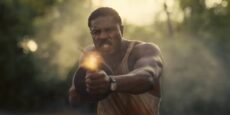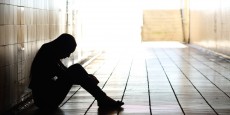Did I trust God’s plan for the life of my child with disabilities?
That’s a question I’ve been mulling over since our South Dakota camping vacation ended with a surprising twist. The twist being that my husband Hiram tested positive for Covid two days before we were to head home with our camper in tow.
-
We were almost 700 miles from home
-
Hiram had chills, a fever, body aches, congestion, extreme fatigue, and brain fog
-
My towing-a-camper-behind-a-big-truck skills were abysmal
-
The forecast was for 100+ temperatures on the way home
-
My chances of contracting Covid were high. Very high. Very, very high
-
It wasn’t safe for me to drive home under those conditions
My MO in stressful situations has historically been to freak out. This time I didn’t. Instead I listened to the still small voice in my head.
“You are not alone,” it said.
“I have prepared a way to get you home.”
“You tend to what you can do while I do the other stuff.”
What did I tend to?
First I called our daughter Anne and her husband Kailen––we live in an intergenerational home with them––about our dilemma. Next, I went to the drugstore and bought N-95 masks and a big bottle of hand sanitizer. After that, I located a nearby Urgent Care Clinic so my husband and I could arrive there early the next morning.
Then my daughter called and said, “Kailen will get you home. We’ll figure it out. You take care of Dad.”
To make a long story short, thirty-six hours later, with a prescription for Paxlovid in hand, Hiram had improved enough to drive us to the Rapid City airport. We picked up Kailen, he got behind the wheel, and drove all day. We were home and asleep in our beds by nightfall.
I woke the next morning praising and thanking God for the peace he’d bestowed on me and for his provision throughout our mini-medical crisis. Every time I thanked him, a question came to mind.
Image from @chrishcush on Unsplash
“Did I trust God’s plan for the life of my child with disabilities during his frequent medical crises as a baby?”
The answer was obvious and disheartening. I had not. It also led to a second question.
Why not?
The answers poured out. Fear of the unknown. Fear that our baby would die. Lack of warning. Lack of preparation. Lack of experience at age twenty-five. Feelings of personal incompetence. Realizing our son had experienced what I thought was the worst that could happen, only to experience something worse.
Eventually, Hiram and I found our feet as parents of a medically-fragile child. Eventually, our son was no longer medically-challenged. As his physical health stabilized, I believed my trust in God’s plan for our son’s life had increased and that my faith had become mature and unshakable.
Then as he went through his teen years and became a young adult, our son began choosing his own path.
-
Not always wisely
-
Not seeking our advice
-
Not listening to our warnings
The time had come to lean into my mature and unshakable faith. But trusting God with our young adult son was harder than trusting him with our baby, and I failed miserably once again.
Why was that?
Strange as this may sound, much of my lack of faith stemmed from parenting a medically fragile child. God had shown me that he was in control, and I was not.
He could choose to heal my son…or not.
He could intervene to save my baby’s life…or not.
As our son ventured into the world, I now knew that true meant trusting God, whether or not his plan for my child’s life matched what I wanted.
As the parent of a child with disabilities and special needs, have you ever been in that place Perhaps because God isn’t answering your prayers the way you had hoped…
-
as your child’s mental health deteriorates
-
as the doctor says his physical illness is terminal
-
as your daughter keeps making poor choices
-
as your son’s job opportunities are poor
-
as your daughter’s independent housing options are limited
You are not the only parent to struggle with giving your child completely into God’s care. It’s easy to trust God when his plans match our hopes for the child he’s entrusted to us. It’s much harder, in fact almost impossible, when, from our earthly perspective, his plan appears to be the worst thing that can happen.
When you’re in that headspace, consider God plan for his own Son during Jesus’ time on earth.
The crucifixion, from the vantage point of his mother and his disciples,’ as they sat at the foot of the cross, was the very worst that could happen. It was the end of all their hopes and dreams. In an earthly sense, it was the worst thing that could happen..
God, on the other hand, knew it was not the end, but the beginning.
-
The beginning of the end of pain and sorrow, of loss and despair
-
The beginning of making all things new for all of creation
-
The beginning of spiritual healing for our children with disabilities
-
The beginning of trust in God for parents who yield to him, even as our hearts are breaking.
Did I trust God’s plan for the life of my child with disabilities when he was a baby?
No.
Did I trust God’s plan for the life of my child with disabilities when he was a young adult?
Not so much.
Do I trust his plans now?
When he prompts me to train my gaze upon him, his Son, and the glory yet to come, by his grace and power,
I do.
Therefore if anyone is in Christ, he is a new creature; the old things passed away; behold, new things have come. 2 Corinthians 5: 17 (NAS)
Jolene Philo is the author of several books for the caregiving community. She speaks at parenting and special needs conferences around the country. She’s also the creator and host of the Different Dream website. Sharing Love Abundantly With Special Needs Families: The 5 Love Languages® for Parents Raising Children with Disabilities, which she co-authored with Dr. Gary Chapman is available at local bookstores, their bookstore website, and Amazon. See Jane Dig!, the fourth book in the West River cozy mystery series, which features characters affected by disability, will be released in October of 2024.

Source: Special Needs Parenting- Key Ministry






